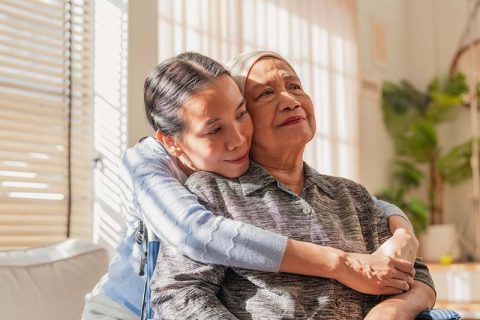July 21, 2025 by

Cancer often introduces itself in a thousand different ways. Sometimes it’s a dramatic entrance – an emergency room visit, a biopsy result, a word no one wanted to say out loud. Other times it’s a slow burn, a handful of symptoms that don’t quite add up until they suddenly do. But however it begins, one truth tends to follow closely behind: cancer doesn’t affect just one person. It affects everyone around them. And knowing what to expect as a cancer caregiver is paramount.
When someone you care about is facing cancer, stepping into a caregiver role can feel instinctive. You drive them to appointments, make meals they can stomach, listen when the words come easily, and sit quietly when they don’t. But even with the strongest intentions, caregiving comes with unexpected challenges: physical, emotional, and practical.
Routines will shift—frequently.
It’s not uncommon for daily life to revolve around treatment schedules, side effects, and how the person you’re caring for feels on any given day. Some mornings will allow for a full breakfast and a walk around the block. Others may require canceling plans because of fatigue, pain, or nausea. What works one week may not work the next, and learning to adapt without frustration is an ongoing part of the process.
Medical information can be overwhelming.
The volume of information that comes with a cancer diagnosis can be staggering. Doctors often explain things quickly and in terms that are unfamiliar. You may be handed printouts, medication instructions, or paperwork you’re expected to understand and act on. It helps to write things down, ask questions (no matter how basic they feel), and find a system for organizing information. Being prepared doesn’t mean having all the answers, but it does mean knowing how to find them.
Emotions may surprise you – both theirs and yours.
The person you’re caring for may not always respond in ways you expect. They might withdraw, become irritable, or seem emotionally distant at times. These changes aren’t necessarily about you, but they are part of what makes caregiving so emotionally complex. It’s also common to feel conflicting things at once: love and frustration, hope and fear, purpose and exhaustion. These feelings can coexist, and acknowledging them can be a relief in itself.
It can be isolating…but it doesn’t have to be.
Many caregivers find themselves gradually pulling away from their usual routines and support systems. There may be less time to connect with friends, attend social events, or even take a moment to breathe. But staying connected, even in small ways, makes a difference. A short walk, a phone call, or a moment of quiet can provide perspective and relief. And professional help—even just a few hours a week—can offer time to recharge.
Caring for someone with cancer isn’t a single role; it’s many.
You may become a medical advocate, nutritionist, chauffeur, housekeeper, and emotional support system all in the same day. But beneath all those responsibilities, your presence matters most. You are a consistent thread in a life that suddenly feels unpredictable. That consistency – your calm voice, your gentle reminders, your willingness to just be there – is deeply valuable, even when it doesn’t always feel seen.
Support That Meets You Where You Are
We understand how layered cancer care can be. That’s why we offer highly personalized in-home support to help ease the load. Whether you need help with personal care tasks, meal preparation, companionship, or simply a few hours of relief each week, we’re here to assist families in Salina, Fayetteville, Syracuse, and throughout Central New York.
Call us at (315) 579-HOME (4663) to learn more about how we can support you and the person you care about.
